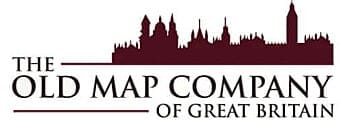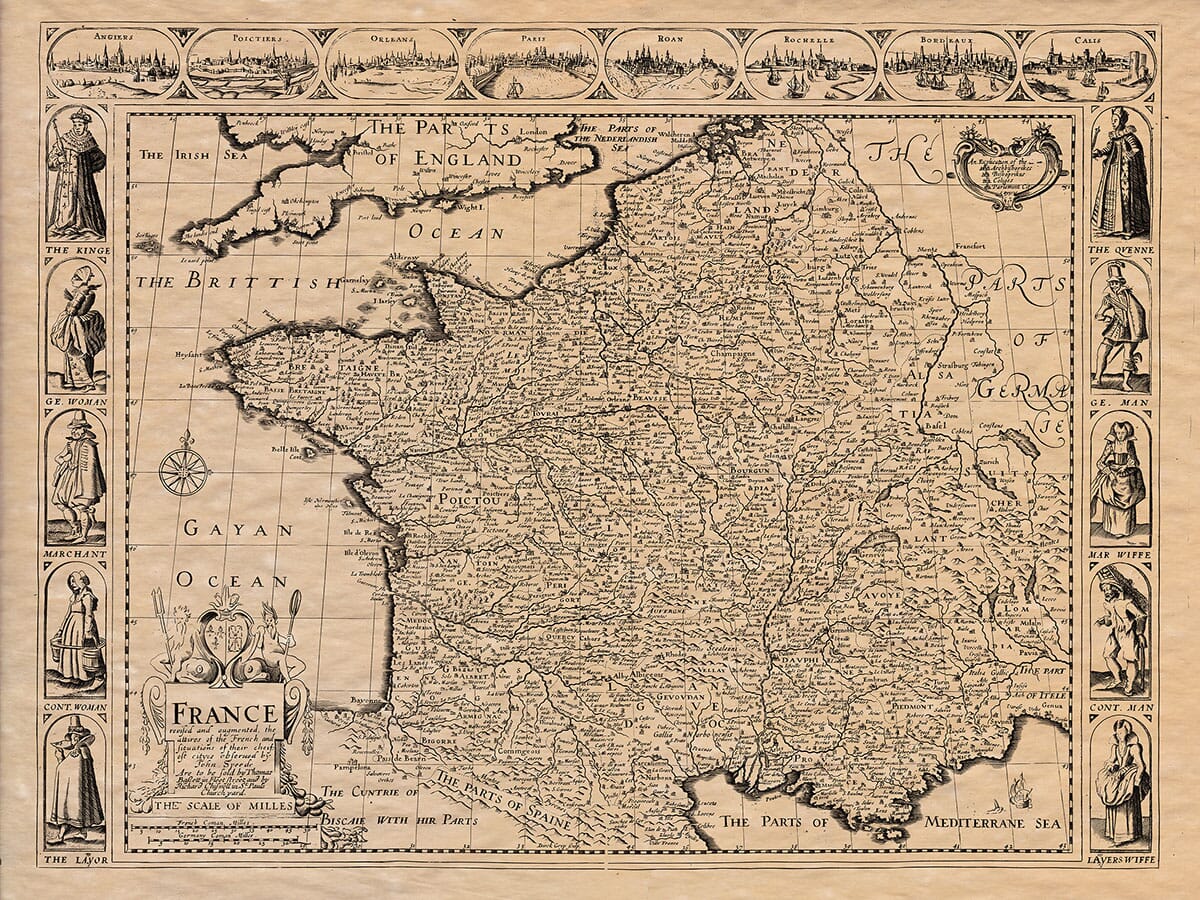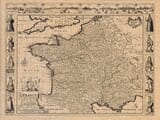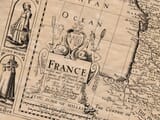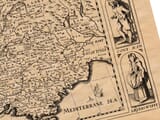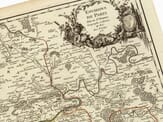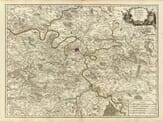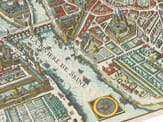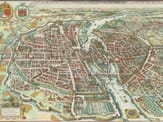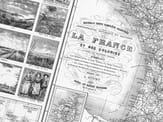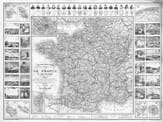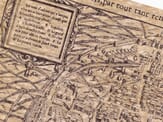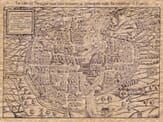Description
On the verso (rear) of the map John Speed wrote a short essay which we have transcribed editing some old names to modern English . . .
The Description of FRANCE
No people but are ambitious to win up in Antiquity as far as their Love in their own reach. Among others, the French are great pretenders to that Title, and fetch their original from Meshech the sixth Son of Japhet, not above one hundred and fifty years after the Ark rested. But this passeth not for current truth among her own Historians; and we observe the place, which gives France here the second place in my division of Europe. I observe rather her situation, which ranks her next to Spain Eastward: and that was the course proposed in my general description.
(2) As for her Inhabitants, the first certainly which we can make good, were the Gauls: a people of whose beginning we can give no unquestionable account: yet this of them is most true, they were a Nation of noted valour above four hundred years before Christ: It is now full two thousand and twelve since they sacked Rome, and took the Capitol. In the memory of that great action we may claim a part. For first they were themselves conquered by the two noble British spirits, Brennus and Belinus kings of England; and after led on by them (if we may trust the story) unto those glorious adventures which to this day continue their fame almost above any other Nation. Let the proof rest upon my Author. This faith Matthew Westminster professeth out of the Roman History.
(3) Trecentis millia Gallorum ad sedem suorum quærendos prodierunt: Bellino & Brenno Roman ingrediuntur, bipen de mortui sunt. Sed nihil minus effecit primum divinitus, quidam Martii scipionem, mox diversis gentibus aliis Graeciam, Macedoniam, at Thraciam committentes: ut sua post ea urbe domitum etiam totam Asiam repeterunt. Tantas interea cladis ornamentis, insignioris felicitatis est illis obvia ut rege Orientis bene merito veniam esset in bella deferre non fastidiret, eos, passi a regno ad alium quam ad Gallos consignet. Non enim aliter Magister suum naturi, res animam recepare se ipse sit Gallis iterum attribuerat. Itaque in eumdem regressi Bithyniae vocati, regnum eo penetrata vi summa diversarum gentium regione Gallo-Graeciam comprehendunt, which we now call Galatia. And thus for a time their victories carried all before them: yet at last they had their turn to fail of fortune; were expelled Rome by Camillus, feared at their neighbours did, and became tributary to the Empire.
(4) Then did the name of Gallia comprehend a large portion of Europe, besides that which we call France: and that by the division made in Cæsar’s time: which indeed was a part of Italy, that which we now call Lombardy: and Transalpine, which Philip calls Comata, from the curled hair of the Inhabitants, and Ptolemy Celta-Galliam, as the Greeks gave it. Nor yet was this equal to the name of France, but was again divided by Cæsar in his Commentaries, (1) into Belgicam, which for the most part now pertains to Germany. (2) Celtaicam, and (3) Aquitaniam. After him Pliny gives a third division into four parts. (1) Aquitanicam, (2) Lugdunensem, the same with Celtæ Senonum, (3) Narbonensem, or Braccatam, and (4) Belgicam.
(5) We must here pass the out-tracks of Belgium and the rest, and confine our tract to those parts which are now governed by one King. And though it retain still the ancient appellation, which the Inhabitants received from the Greek Ἀραπης, for their beauty and noble stature; yet it is better and more properly known by the name of France, from the Franci, or Franks, a people of Germany that over-ran these parts, and subdued most of them to themselves.
(6) Now the limits of this new Gallia or France are Westward the Pyrenean Mountains, which divide her from Spain, and run cross the Isthmus that joins both the Kingdoms. They were very famous for rich Mines: in so much the being once fired by Shepherds, the gold and silver ran streaming down into the lower Countries, called up the Inhabitants to pray; and was the first occasion of a foreign entry upon those parts. Eastward it lies upon Germany. South-east it is fenced with the Alps from Italy. Northward it is bordered with our English Seas; and Southward with the Mediterranean. Here the chief Rivers belonging to France are, (1) Garonna Garonne the greatest; (2) Liger Loire the sweetest; (3) Sequana or Seine the richest; (4) Rhosne Rhone the swiftest: to these we may add, (5) Some upon which standeth Amiens.
(7) Her air is healthful, and her grounds fertile; abounding with all the commodities that may make her one of the happiest Regions in Christendom, by her great plenty of Corn, Wine, and Salt, which she distributes among her neighbouring Nations: and enriches her self with such commodities from them as are not so fully afforded within her own limits. The women too partake of the Country’s fruitfulness: so much, that as the earth is scarce able to bear the plenty: so her plenty could hardly sustain her people, had not a vent for them into Spain, Italy, Germany, England, and other Countries: And yet were there long since recorded, Habitatores supra quindecim milliones, inter quos adducim millia nobilium, by Maginus.
(8) In so great a multitude we must look to find as much variety of customs and dispositions. It was the report of Cæsar long since, and seconded by a late Authentic Author, Galliam gentem linguis, legibus, & institutis inter se differentem, multam tamen similitudo communionis. For the most part they are of a fiery spirit for the first onset in any action, but will not long stand. They desire change of fortunes; and pass not greatly whether it be better or worse. Their women very sound, of a voluble tongue, and as free of their speech, complexion and strangers, and win more by their wit than their beauty. They are great censurers of men’s conditions; and such enjoy them as freely and securely, without either check of conscience, or care of report. It is esteemed l’esprit gaulois; and indeed a man can hardly hear ill for it from any there, which is not equally guilty. Very factious not only in carriage of public affairs, but in private families, which proves for the most part to the self-conceit of their own wit and wealth; and those will hardly admit a superior. Their Nobility have been reported to be liberal: but I suppose that fashion is now worn out: my self have specially noted that contrary in divers, which respect their purse more than their honour, and let pass the service and deserts of worthy persons unrewarded, as if their gracious acceptance were sufficient return of thanks for any office you can do them. They are practised to this garb by their peasantry, whom they reckon but as slaves, and command as their proper servants, which the poor takes as nature, and are glad to be commanded by their betters, that by their protection they may find more free from the injury of their equals. For the meanest of them are cruel, and affect to oppress their adversary, either by open violence, or, if out in law, though to their own ruin. They are very ready to take arms, and serve in the defence of King and Country: need no more press than the stroke of a Drum: but are as rash in their actions. They will not wait upon counsel, but run as far on, as upon their first strength they may; and when they find that fails, they fall soon to the ground.
(9) It hath had her heretofore (and yet breeds) men of great esteem for Learning and Religion. St. Bernard, Calvin, Beza, and Ramus, were French, and many others, both of the Roman and Reformed Churches. For as the people of England have well betook both, but not equally. The Papists are like to continue the stronger hand, as long as their holy Father that makes nature a meritorious Act. For by their several Massacres they have destroyed many Assemblies of the Huguenots, as they call them. The greatest in that kind was practised by such as had entertained the name of Christians, was at Paris in the year 1572, when above thirty thousand souls suffered martyrdom; and among these many of good note.
(10) It is subject to a Monarchical Government, wielded by one sole and absolute King, who bears the title of the Christian King of France: his eldest Son the Dolphin of France: their Salick Law, no woman lets her stay in inheritance: how justly, I may not determine. But yet the English have good reason to examine the equity. For it cut off Edward the Third his Crown of France, to which he was heir in general by Marriage of a Daughter. But the truth is, we have been ever easy to part with our hold there, or at least forced to forego it by our civil dissensions at home, after all those glorious victories of our Predecessors, we might have had some power more to them there as well as title.
(11) There are very many Provinces belonging to this Kingdom, more than will find room here for their full descriptions in several; and therefore we will reduce all these new Frances, as the old Gallia to the four parts of Ptolemy’s division, (1) Aquitania, (2) Lugdunensis, (3) Narbonensis, and (4) Gallia Belgica. To these we will add (5) the Isles adjoining. Their principal under-Territories shall be mentioned as Maginus ranks them.
(12) Aquitania lieth on the West of France, close upon the Pyrenean Mountains and Continent. (1) Andorra part of Baya renowned in the Map of Spain, and indeed different from that but very little. (2) Gascony and Guienne, to this day keeps its name (with a very little change) from the Spanish Vascone. The chief City is Burdigala or Bourdeaux, a Parliamentary and Archiepiscopal Seat and University of good descent, was honoured with the birth of our Richard the Second. Another City of note is Tholouse, a Seat of Parliament, and populous enough to be ancient as the Rule of Debates in Italy, Vienna. This Gascogne contains in it many fair Towns, as Foix, Cominges, Armagnac, and the Dutch Albret. (3) Pictavia, Poictou on the North of Garonne, a pleasant Region, and plentiful. It contains the Bishoprics, Poitiers, Lucen, and Maillezais. Her chief Cities are Poictiers, an ancient and the largest next Paris in all France. (4) Saintonge, a Province little of the Scott Earls of Hamilton. In this Province was fought the great Battle betwixt our Black Prince, and John of France, where, with eight thousand, he vanquished forty thousand; took the King prisoner, and his Son Philip, 20 Earls, 50 Barons, and 12000 Gentlemen. (4) Somotia, so termed from Poictou, but by the River Canent, and so differs but little from her fertility. Her Metropolis Saintes. Other chief, Bourg, Blay, Marenne, Saint John D’angel, and Angoulesme. Betwixt this Country and Poictou stands Rochel, a place the best fortified both by nature and art of any in Europe. It is at this time possessed by those of the Reformed Religion; where they can live upon their own strength, and there find freedom of conscience against the Roman Catholics of France.
(13) Limoges in Limo sina (saith some) Maginus takes it from Lemoger the chief City toward the North: which revolted and was recovered by our Black Prince. Her other Towns of note are Tulles, and Uzerch, and Chabane, where Richard the first was shot. It hath been by turns often by French and English, till Charles the Seventh. Since we have had it to hold there. (5) Berry, regio Biturigensium from her chief City Borge, now Berya, an Archiepiscopal See and University. It is exceedingly stored with hemp, and sufficiently well with other Merchandise of value. (7) Bourbon, from her chief City Bourbon. (Thereabout Baya) a Duchy and Kingdom much frequented by Princes, and the Nobility of France, by reason of her healthful Air, and commodious Baths. (8) Tureen the Garden of France. Her chief Cities, Bloys, Ambois, Tours, and a little higher upon the Liger stands Orleans.
(14) Lugdunensis or Celtica lieth betwixt the Rivers Loire and Saone, and takes the name from Lugdunum or Lions her chief City. This Province comprehends (1) Brittany, heretofore Armorica, till subdued by Maximian King of England about the year 367. Since it hath had the name of Brittany, and for distinction from this of ours, it is commonly called Minor Britannia. There is yet remaining a smack of the Welsh tongue, which it seems the Inhabitants had got a desire to refine the parts as a trophy of their Conquests, that when they first mingled in marriage with the Inhabitants, they cut out their wives tongues, as many as they matched: so no sound of French might be heard among their children. It hath few towns, but that defect is (in some measure) made up by the neighbourhood of the Sea, insomuch that the Country is exceeding fruitful, and doth fertil in all France, for Corn, Wine, and Wood. It breeds good Horses, and special Dogs, Iron, Lead, &c. Her chief Cities are, Nantes, Rennes, St. Brieux, and Vennes. It is divided into Britanny minor, and the base or lower Brittain Westward, and nearer England, and superior toward the Loire Eastward. Her chief parts are St. Malo and Brest. (2) Normandy, a part of the Region which was heretofore called Neustria, and took the name it hath from the Norwegians. Their first Duke was Rollo, and the first from him was William the Conqueror. It was lost from his Successor in the time of King John. Her chief Cities are Roan, or Rouen; the Metropolis Courtly and Causey, and remarkable for the siege of our English Henry the Fifth: And Verueil, besieged by Philip the Good of France, in the time of our Richard the Third: within which the King had a notable state in his seat at Whitsuntide, if his enemies had not he would never turn his back to France till he had his revenge: and once made good his boast, that he trod the walls, and justly performed his threat upon the beleaguer. Her principal Ports are Harfleur; the first which King Henry the fifth of England assaulted; and New Haven given up by the Prince of Conde to Queen Elizabeth as a pledge for such Forces as she would joyn with to maintain Wars with the King in defence of Religion. And Diep, &c. (3) Anjou regio Andegavensis, a fertile Country, and yields the best Wine of France, excellent Marble, and other fair stone for building. (4) Mayne, of the old Aulani, whereof, which Ortelius takes to be Ptolemy’s Juliomagus. It is now an University. To this Dukedom there are four Earldoms which give a kind of homage. Mayn, Vandos, Beauf and Laven.
(14) France, which gives name to the whole Kingdom, and received her first from the Germans or Franks, which before inhabited the great Forest called Sylva Hercinia. Her chief City, and the glory of France, is Paris or Lutetia quasi in Luto sita, compassed twelve miles in compass and the third Academy of Europe, consists of fifty five Colleges, and here was Henry the Fourth King of France and England, in his younger years, Crowned in the famous Church of St. Vincent, where Henry the fifth died: and Soissons and the Dukedom of Valoy, &c. (5) Campaigne and Bry partners in the title of Earldoms. It is severed from Picardy only with Rivers. A fertile Country, and hath many eminent Cities. The principal of which, where the Kings most commonly are Crowned, and anointed with the Oyl (not they say) from Heaven, which (as oft as it hath been denied) never decaies. It hath the Seat of an Arch-Bishop, and University of note, especially with our English Roman Catholics who have a Colledge there appointed for their fugitives, and others of note are Troyes, and Bry, and Auxer, and Sens, an Arch-Bishop See, &c. (6) Burgundy, once the Dutchy and County, but by inheritance and the sword of the French Kings annexed. The Dutchy or Burgundia inferior, and the Western Lyon the South of higher Germany. Principal places are Dijon, Saint Bernard’s Birth-Town, Autun, Beane, Salogy, and Alise, once the famous City of Alesia. The County of Burgundy, or Burgundia superior, yields not to the choicest Garden in France for fertility of soil, nor to the renowned for goodness of the Inhabitants. They acknowledge not as yet the French Common as more than Savo and Lorraine. They were under divers Generals, and are called Walloon, corruptly for Gallos. It is rich of the choicest Wines. Chief Cities are, Besancon, the Metropolis both of the Bishop and Earl, Salieres, Array, Dola. (7) Languedoc Territories: Lion an illustrious City. The Center of Europe: a mean where Merchants meet from all Christendom. And these Provinces belong either wholly, or at least in part to Gallia Lugdunensis. Her forces lend to be divided, and direct into their language and forces. Campania into Belgia, and this last Languedoc is in part under the Government of Savoy.
(14) Narbonensis Gallia on the West with the Comtats Avenois and Comingeis, Eastward part of the Alps, Northward the Mountain Cevenna, and toward the River Seas is generally all Countie, which . . .
here John Speed’s notes on the verso of his Old Map of France continues to page 2
. . . is generally all Countie, which for richness, even in the time of Pliny, to say it self: it comprehends the Provinces of Languedoc, supposed from Languedus, a language of the Goths. It reaches from the bounds of Armaniac and Comminges to the Mediterranean. Her chief Cities are Narbon, from whence she took her name of Narbonensis, and is reckoned the first Roman Province in Europe, and Mont Pelier, a University not famous for her wealth, but of Physick. Nismes, where there is that so many reliques of antiquities, and Pont S. Esprit, &c. (2) Provence province of great wealth, divided from Languedoc by the River Rhodanus Rhone. It belongs part to the Crown of France, part to the Pope, and a third to the Prince of Orange. In the Kings portion are Arles, a Parliamentary City, and Marseilles, the best built in the time of the Roman August, on the Bishop of Rome election Assessor, a City, and Arch-Bishop See, with the whole Country near adjoining. To the Prince of Orange, of the chief City Orange, with the Towns of Menton, Eignes, Bay, St. Pol, &c. (3) Dauphiné on the North of Provence, by Maginus it is divided in Delphinatus Viennensis and inferioris: the first contains in it Vienne, where Agrippa and Mamma is plentifully gathered, and Valence, &c. The latter Grenoble and Briançon. (4) Savoy Sabadia on the East of Dauphiné, a Dukedom, within whose limits the well known City of Geneva stands, entertains people from all Countries of any Religion: but yet enforcement a law upon fugitives, not common elsewhere; for whosoever malefactors there are apprehended for mischief done in his own Country, suffers as if he had been there committed. The principal Cities are Chambery, Nice, Tharentasia, Belley, Maurienne, &c. To this Dukedom belongs Cambray on the West side of the Alps, and that of Piedmont, wherein his second Prince of Piemont, a part of Italy a very East-foot of the mountains, which sever her from this Country.
(15) Gallia Belgica the last, is the Eastern tract toward Germany, and as much as belongs to this Kingdom contains 17 Provinces, which is divided into the higher and lower. The first proceeds towards the British Seas, and her lands call Flanders that thirty miles from Dover: it is that which Cæsar called Portus Itius, now from the Frezby our near Graveland, built by Queen Mary: upon her confines toward England by the County of Boulogne, and Guisnes, which contain sundry Towns and Villages. The chief Boulign, conquered by our Henry the Eighth, but delivered back in the Reign of Edward the Sixth. In this Picardy stands Terwin, besieged by King Henry in person, where the French King himself was taken, and his Nobles, and received pay as his followers. In these Picardy lands Artois and Hainault and the Marches of Flanders and Artois, with the rest of the Low Countries, yet still by many Titles belong to France. Here are the Duchy of Guise, whose chief City is Guise, which gave the name to the Family of the Guises; and the Country of Vermandois, where Saint Quentin stands, the Restorer, and Revetter Metropolis Athis and Lesteree per Pomblen and Abbeville.
(16) The Islands which are reckoned properly French, as those lying in the Neer an the Atlantic Ocean. They are but few, and of no great account: the principal, Dames de Bouin, L’Isle de Dieu, Marennes, Isle d’Oleron.
